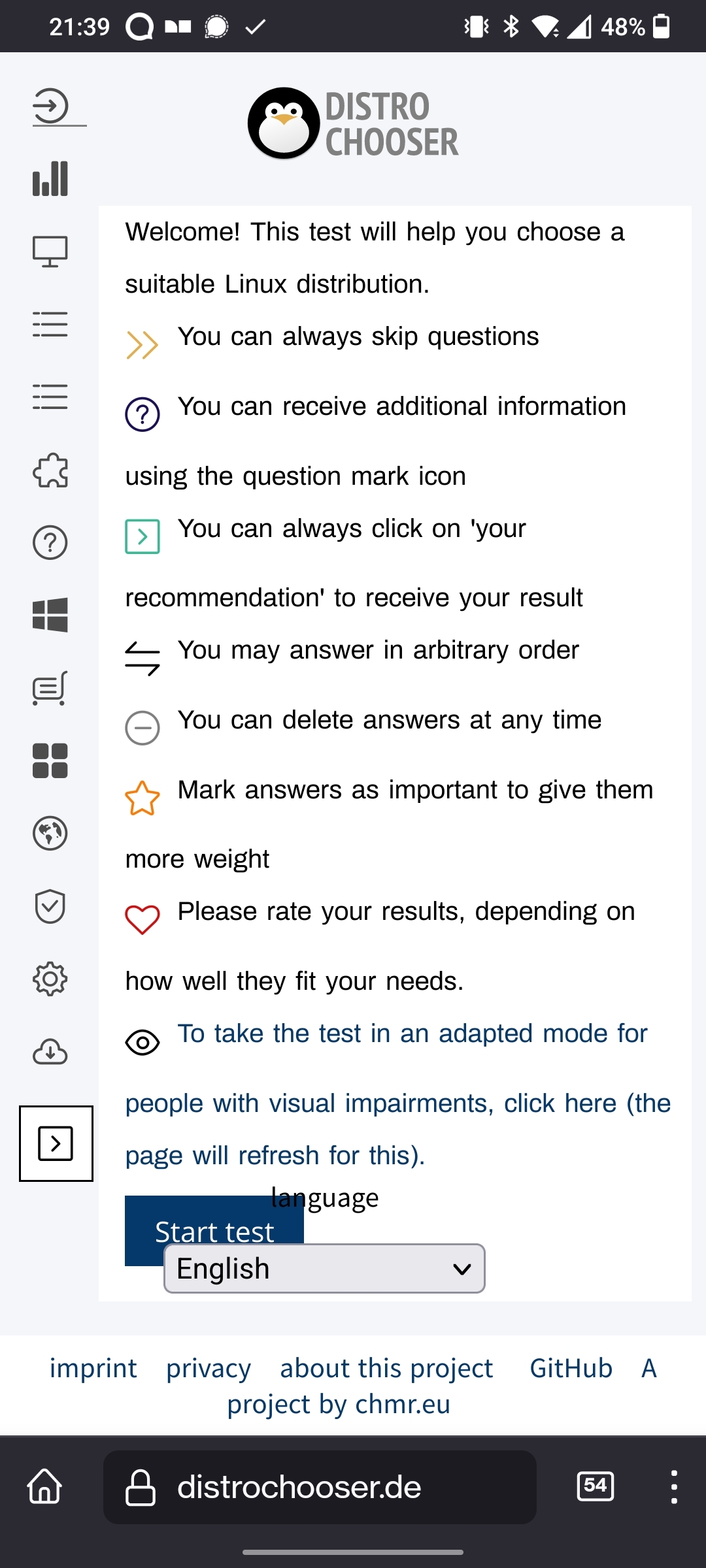There are countless Distros that do not always make it easy to choose the one that best suits each person’s needs and knowledge. This page, through a small test, proposes the Distro or Distros that best fit.
deleted by creator
Yeah, Same Here. A “chooser” that offers 30 options kind of fails in its core functionality…
deleted by creator
It misses one important choice: “I want to get notified of new releases of the operating system and want to have a graphical upgrade path.”
Otherwise people just run their no longer supported OS until something stops working (I’ve seen this countless times …), as very few people follow blog posts or social media feeds of their operating system.
This rules out lots of supposedly “beginner friendly” distributions, such as elementary OS or Linux Mint, as they don’t notify users about the availability of a new distribution release. Elementary OS doesn’t even offer in-place upgrades and requires a reinstallation.
Is that just something that’s intrinsically missing from some distros due to technical constraints or is it a regular type of feature the simply hasn’t been implemented (yet) due to… human constraints?
Linux Mint nowadays supports release upgrades, but you have to follow their blog to know when a new major Mint release is out and you have to manually install
mintupgradeand do the upgrade.So it is definitely not caused by technical constraints, as Mint has implemented the difficult part (providing and testing an upgrade path) already. Notifying the user about a new release upgrade shouldn’t be too difficult? E. g. in the most simple form you could probably preinstall a package that does nothing at first, but receives an update once the next Mint release is out to send a notification to the user to inform about a new Mint release.
When it comes to elementary OS, I think they could support in-place upgrades, as they properly use metapackages (unlike Mint, which marks most packages as manually installed and doesn’t really utilise automatically installed packages and metapackages in a way that you would expect on a Ubuntu-based distro), but they probably don’t want to allocate / don’t have the resources to test an official upgrade path.
But again, I don’t understand why it is so difficult for elementary OS to at least provide a simple notification to the user that a new version is out. Even if the users have to reinstall, it is critical to inform them that their OS is about to become end of life. You know, people do things like online banking on their computers …
It’s the first thing I check with every distribution and if it doesn’t have an EOL / upgrade notification, it is immediately out.
someone could develop a program that notifies you when new updates are available for linux mint
mint update notifier
Here is Distrochooser for you in a comment: Install Debian with GNOME, configure Flathub and enjoy the latest software on a rock solid , truly open and private OS. Done.
Now seriously that website is cool.
Debian is okay, but needs a very manual setup. I would add automatic updates, removal of many bloat preinstalled apps, autoremove, adding nala and fish, etc.
It has automatic updates… at least with gnome software.
Automatic as in “no user interaction required”? Also gnome software uses packagekit, which makes updates less stable and slower.
I dont need any confirmation dialog. A system has to either:
- be stable
- always autoupdate
- give a message that a reboot is needed
Or a Laptop or so also has to listen to battery state and unmetered network.
Unmetered network is hard though, as its not a phone with cell Data but its always wifi, simply in case of a phone hotspot not unmetered. This is not recognized currently afaik, so all networks are set as unmetered and autoupdates would eat your cell data.
I was expecting this to be a randomized selector. Just roll the dice!
Why does this quiz have so many fuckin distributions? If a newbie is looking for a distro to install, why would you ever recommend anything more niche than Ubuntu/Mint, or Endeavour if they’re interested in bleeding edge? I answered the questions as though I was new to Linux and got a massive list of every Ubuntu and Fedora derivative, with Manjaro sprinkled in for good measure.
Look at the colors, which shows which distros ajust best o worse to your results, with the correspondin descriptions which match your answers in the test. Better to have a list to choice between 10 or 20 distros than between several hundreds which exist, impossible to know all of these. This large quantity, on the one hand, is an advantage, because everyone can find exactly the OS they need for their purposes, but it can also result in a problem of compatibility for the development of software and availability of certain drivers.
I am very new to linux. this is actually great for me because of how detailed the results are. it doesn’t just say “this one.”
it gives pros and cons based on the things you want to do with your install. which is very nice when this is all new and you’re not sure what they all are really for.
it means I can learn a little about every distro, not just the ones that might be right for my needs at the time, but maybe later if I want to use a different one for something else.
more distros means more for me to shop around for. it’s nice to have more options, not less.
Right, but the fact of the matter is you can do most things on any distro, it’s very rare that any one distros is “really for” anything specific. They’re not all that different to one another at the end of the day, and to a new user potentially paralyzed by choice this site doesn’t really help either.
Sometimes it’s much easier to say “here’s 3 that offer the most stable new experience, try them out.” And afterwards if you get really tech savvy then go down the niche distro-hopping rabbit hole.
More distros is certainly a good thing, but most new linux users don’t even know what they’re looking for or would even get to the technical depth where the difference between any two distros would actually matter to their daily use. Even more so with the current migration of gamers onto Linux.
I too am a new to Linux person. I started with mint, as the most like what I’m used to. I like seeing that there are options I might like better, along with why I, personally, might prefer them. as well as why mint didn’t rate high. and I like that it’s not just spitting out the creator’s favorite distro.
some people get decision paralysis, i get your recommendation. but you’ll also lose some people if you just give them the Linux that’s easiest and closest to what they already know, instead of highlighting how it’s flexible and customizable. we need both methods of recommending a distro.
there’s plenty of beginner guides telling me to start with mint. I like this picker that considers my interests. looks like I might be trying OpenSuse in the future.
I am a new user and I appreciate the breakdown of each one. I am the theoretical “new user” you’re talking about. And I like how it’s set up. So there you go. you have one new user who finds it useful.
I think it’s nice to learn stuff. I’m not so simple minded that more choices is going to “scare me away”. this isn’t life or death, it’s just an OS.
You are also not indicative an entire category of potential new users. You are also clearly not the majority who I am referring to, no need to take it personally.
I’m not taking it personally. you’re saying less is more. I’m disagreeing. that’s all.
Let me guess: everyone just tried it out to see if their personal choice will be recommended?
I prefer a distribution which is supported by game publishers.
?! Is that supposed to tell the quiz that I’m looking for something to play games on? Or why should I care what the odd publisher may “support”?
This site was made by someone who was active on Reddit a few years back. It was made back when Steam specifically provided support for Ubuntu and no other distros.
You can skip this question if you are not interested in playing, but each user has other needs, some distros serve as a platform for games and others not at all.
Pretty good tool. I took the quiz out of curiosity, and the top result was my current distro
i got linux mint
This page is completely unuseable with Firefox on Android!
Edit: screenshots


It’s completely useable for me
I couldn’t even start the test because the button was entirely hidden, added some screenshots 👆
??? i was using Mobile iceraven for the test
I’m using fennec on android
Worked fine for me
Arch user. Just had a really good experience with Debian on old 32bits hardware. The survey suggested Debian. I’m thinking if I shouldn’t use Debian everywhere instead of Arch everywhere.
A nice Debian Q4OS
I like the tool and am going to keep playing with it, but in my first run I’ve found that it seems to have an issue with the “App Store” vs “terminal command” installation question. My final results, having chosen “terminal commands,” listed some distros as not recommended because of manual install, including arch, gentoo, void, etc. Otherwise big thumbs up
Edited to add: https://distrochooser.de/en/d51d8e6a10f1/ my results
The link button requires setting both the display and URL. For using the URL as the display text, just leave the URL alone: https://distrochooser.de/en/d51d8e6a10f1/
Edit: Accidentally replied to wrong comment
Oops, thank you. I appreciate the reply. First time linking something here
Broken link
Yes, sorry, I made a mistake when linking. The commenter PoolloverNathan left the correct link
deleted by creator
deleted by creator
I have been thinking about trying to use Linux for my daily driver again and have been mulling over which distro to use and I kind of narrowed it down, and then I took your quiz and now I’ve got like 60 more options. 😒
The first results of the test are mostly the best for you, it is ordered from the best match to the least
“Requires reading up in manuals for usage” why is this considered a pro…?
Some distros are less intuitive to use than others, apart from also having particularities that others do not have and that require reading the manual, at least in part, also for ‘pros’ who are not familiar with the specific distro. Ubuntu, Q4OS or Mint, easy to use, are not the same as Parrot, Kali (both are for IT experts), 4MLinux (very lightweight, but not so easy to handle as it seems) or Gentoo (among others), which are certainly not made for newbies.
I understand that, but just because I’m capable of working with a less friendly system doesn’t mean it’s a good thing. If anything I’d still list it as a negative aspect that it requires more knowledge and research.
If there was a question with an answer like “I’m looking for a challenge” it’d make sense that it’s listed as a positive.














